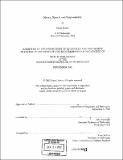| dc.contributor.advisor | Sally Haslanger. | en_US |
| dc.contributor.author | Maitra, Ishani, 1974- | en_US |
| dc.contributor.other | Massachusetts Institute of Technology. Dept. of Linguistics and Philosophy. | en_US |
| dc.date.accessioned | 2009-01-23T16:39:52Z | |
| dc.date.available | 2009-01-23T16:39:52Z | |
| dc.date.copyright | 2002 | en_US |
| dc.date.issued | 2002 | en_US |
| dc.identifier.uri | http://dspace.mit.edu/handle/1721.1/8150 | en_US |
| dc.identifier.uri | http://hdl.handle.net/1721.1/8150 | |
| dc.description | Thesis (Ph. D.)--Massachusetts Institute of Technology, Dept. of Linguistics and Philosophy, 2002. | en_US |
| dc.description | Includes bibliographical references. | en_US |
| dc.description.abstract | Pornography deserves special protections, it is often said, because it qualifies as speech; therefore, no matter what we think of it, we must afford it the protections that we extend to most speech, but don't extend to other actions. In response, it has been argued that the case is not so simple: one of the harms of pornography, it is claimed, is that it silences women's speech, thereby preventing women from deriving from speech the very benefits that warrant the special protections in the first place. This dissertation offers a way of making sense of the view that pornography silences women. In Chapter 1, I develop an account of silencing which, unlike other accounts of the same phenomenon, helps make clear why a speaker who is silenced is thereby deprived of the benefits that led us to place a special value on speech. In Chapter 2, I respond to an objection that purports to show that, even if women are silenced, pornography cannot be responsible: in fact, according to this objection, the responsibility for any instance of silencing cannot lie with any party other than the speaker and the audience involved. I show that this objection relies on an overly simplistic picture of what audiences can reasonably be required to do in a speech situation; I also offer an alternate picture, which leaves open the possibility that a speaker may be silenced in a context in which both she and her audience behave competently. | en_US |
| dc.description.abstract | (cont.) In Chapter 3, I consider a view about the way in which pornography contributes to the silencing - and more generally, to the subordination - of women. I argue that this view fails because it is too individualistic: it ignores how the social and political context in which the pornography is consumed helps determine whether it subordinates. I then make some suggestions about what a more satisfactory view would be. Though pornography is the principal case study throughout this dissertation, much of what I say generalizes to other forms of representation that set limits on what speakers are able to convey. The main aim of my discussion is to contribute to the philosophical and feminist understanding of communication, by showing how an individual's social role can constrain her possibilities as a speaker. | en_US |
| dc.description.statementofresponsibility | by Ishani Maitra. | en_US |
| dc.format.extent | 87 leaves | en_US |
| dc.language.iso | eng | en_US |
| dc.publisher | Massachusetts Institute of Technology | en_US |
| dc.rights | M.I.T. theses are protected by
copyright. They may be viewed from this source for any purpose, but
reproduction or distribution in any format is prohibited without written
permission. See provided URL for inquiries about permission. | en_US |
| dc.rights.uri | http://dspace.mit.edu/handle/1721.1/8150 | en_US |
| dc.rights.uri | http://dspace.mit.edu/handle/1721.1/7582 | en_US |
| dc.subject | Linguistics and Philosophy. | en_US |
| dc.title | Silence, speech, and responsibility | en_US |
| dc.type | Thesis | en_US |
| dc.description.degree | Ph.D. | en_US |
| dc.contributor.department | Massachusetts Institute of Technology. Department of Linguistics and Philosophy | |
| dc.identifier.oclc | 51869912 | en_US |

